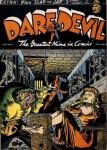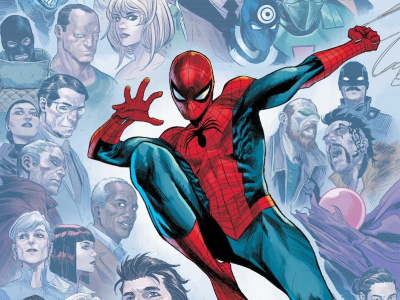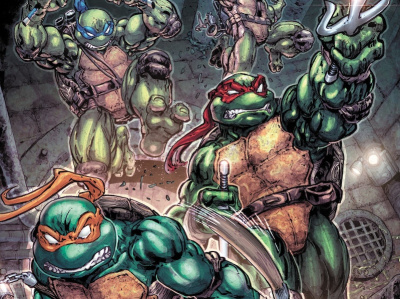
Confessions of a Comic Book Guy is a weekly column by retailer Steve Bennett of Super-Fly Comics and Games in
As you probably know by now I love Golden Age comics, the same way I love time travel and “fish out of water” stories, so you can probably imagine how high my expectations were when all three elements were combined in the entries to the mini Golden Age revival renaissance that started earlier this year. OK, First Issue Project #1 (a.k.a. Fantastic Comics #24) from Image doesn’t meet most of those qualifications but I still enjoyed the heck out of it, so I’m hoping we’ll get to see #2; can a Comic Book Guy get an ETA on a release date?
I’ve tried to balance my love of the “stuff” of the 1940s (comic books, strips, movies, radio shows, etc.) with a working knowledge of the social history of the era and I've got to admit that I was kind of hoping these comics would show the Golden Age characters having attitudes about sex, race, class, etc. in keeping with their decade of origin. Because no matter how out in front the Justice Society of America was when it came to promoting such radical “leftist” notions as the Brotherhood of Man you have to assume no one in this group of privileged millionaires and professionals had ever eaten a meal with a person of color before because, well, that’s just how things were.
Captain America managed to adapt to life in 1963 over the course of Avenger #4 with only a couple of offhand comments about new model cars and the wonder of television, but you’d think in today’s world of decompressed storytelling and 12-issue miniseries there’d finally be plenty of room to explore all the nuances of a group of revived 1940s super characters coming to grips with our strange, new world. Along with being more honest about the challenges they would face, it would also provide plenty of drama, pathos and comedy, not to mention the opportunity to compare and contrast modern superheroes with Golden Age mystery men.
But it’s an opportunity that’s mostly been missed. Sure in The Twelve they revealed one character hid being Jewish to assimilate, while another holds the racist and homophobic attitudes that you’d expect from someone from this era. The other shoe has yet to drop but it’s pretty clear besides being a jerk, this character is also flat out nuts, a shame since it would have been nice to see an otherwise heroic figure wrestling with (what he saw as) our horrible dystopia. Otherwise the rest of the gang don’t seem to have experienced even a smidge of future shock, surprising seeing as how everything they know is wrong (from cats being lactose intolerant to studies having proven mice prefer peanut butter over cheese).
Over at Project Superpower, adjusting to the present isn’t even an issue seeing as how once released from their magical urn (which I call the pickle jar of eternity because after marinating in it for decades they emerge decidedly sour) they’re immediately plunged into a worldwide conflict. They aren’t even given a moment to breathe let alone smell the plug-in air fresheners or marvel upon the miracle that is the cell phone.
And Avengers/Invaders is really just a pretext for a series of fights between the badly confused Invaders and The Mighty and New Avengers who fight The Invaders as well as each other; there’s nothing wrong with a slugfest but all the fights are badly staged and uninteresting. Plus for five issues The Invaders have been convinced they’re in some kind of Nazi controlled future when all it would take to disprove this theory is five minutes in a library, or even less by talking to a person in the street.
Which brings me to the fundamental problem with all three series; they don’t understand what the Golden Age was about -- us. Sure kids gave up their dimes for the mystery men and to get a vicarious thrill out of their incredible deeds but they knew they were being performed for our benefit. Today’s heroes may still pay lip service to protecting us but they’re cut off from humanity, hermetically sealed in their own world high above ours. As far as I can figure out the last time Tony Stark actually spoke to someone who didn’t work for him it was Thor, God of Thunder.
I may miss the human touch they had but let’s face it, the mystery men I’m so fond of were wafer thin constructs, callous, sanctimonious and prone to outbursts of extreme violence (even worse were their jokes). They were created to be goofy disposable fun so I really didn’t mind that much when Dynamite basically blanked the public domain superheroes they collected and remade them into whatever they saw it.
Except for Daredevil. It was the underappreciated genius of Charles Biro made the character into a moral authority, a force for social justice who fought the causes of crime as often as criminals. I’d like to think everyone knows about these great stories, then I read this piece on Newarama about the project superpowers spin-off Death Defying Devil debuting in December, written by Alex Ross and Joe Casey with art by Edgar Salazar. I quote: “Joe Casey: I first heard about the golden age Daredevil back in the early 80s when I was a kid hooked on Miller's Daredevil work at Marvel. I loved the costume, and I was kind of intrigued by the use of boomerangs as weapons.”
I know it won’t prepare you for writing future issues of Death Defying Devil but you really should go to http://goldenagecomics.co.uk and read the public domain original comics. You’d discover Daredevil was so much more than a cool looking costume.
The opinions expressed in this Talk Back column are solely those of the writer, and do not necessarily reflect the views of the editorial staff of ICv2.com.







